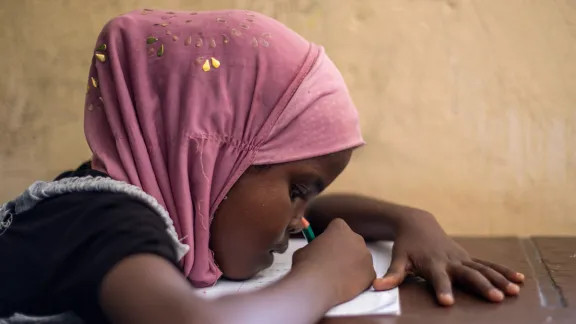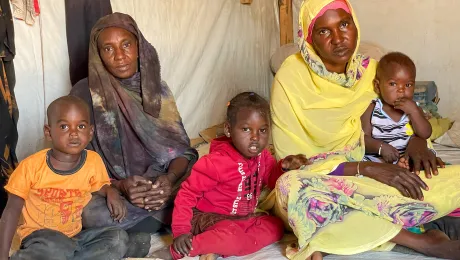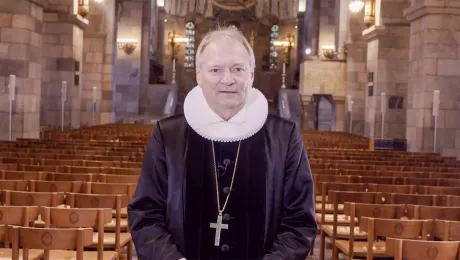
A girl from Somalia studies in an LWF primary school, Ali Addeh camp, Djibouti. LWF strongly advocated for girlâs education and against early marriage. Photo: LWF/ Heléne Wikström
Refugees speak about the importance of education for girls
“Education is light, ignorance is darkness,” says Fatuma Aden Siyad. If this would be be applied literally, the young woman from Somalia lived in darkness for the first eleven years of her life.
Her family fled the Somalian capital of Mogadishu in 1991, when the war broke out. They were not able to return since. Fatuma was born in Djibouti in 1995. All her life, she spent in different refugee camps. As there was no formal education for refugee children in Djibouti, she never went to school.
Institutional challenges
Formal schooling for refugee children is a challenge in many countries. “Children make up one third of the global population, but are half of all refugees,” says Lennart Hernander, LWF Country Representative in Kenya and Djibouti. “More than 28 million children have been driven from their homes.”
While some countries absorb refugee children into local schools or take responsibility for refugee education through curricula, examinations and certifications, the issue is unresolved in other countries. “Many refugee children don’t have access to primary education, which means they are exposed to exploitation and abuse. Children who don’t receive an education become part of a vicious circle with uneducated or under-educated children, youth and young adults,” Hernander says.
In an unprecedented move in Djibouti, the government has just officially welcomed refugee children into the national education system. Before that, The Lutheran World Federation (LWF) has provided informal schools, to make sure the children do not miss out on basic education. Almost 4,000 refugee children and youth currently learn in LWF institutions in Ali Addeh and Hol Hol camps. Even without the official government certificate schools make a big difference in the life of especially girls, as the example of Fatuma and her peers shows.
The first day at school at age eleven
There is something very determined about the young woman in the black tchador. Under the traditional garment, she wears a colorfully patterned robe, and around her face a head scarf with bright purple dots. Fatuma sat in a classroom for the first time when her family was relocated to Ali Addeh camp in 2006, where LWF runs schools and kindergartens. She was already eleven years old then, and very determined to make up for lost years.
Five years later she started secondary school, finished grade 10 and while studying for exams, already looked for a job to support her family. Today Fatuma works as a hygiene promoter, teaching children the importance of using latrines and washing hands to avoid getting sick. “My education helped me get that job,” she says. “I am grateful to my teachers and my parents, who supported me. God willing, I would like to be a doctor one day.”
A job because of education
Women like Fatuma can be role-models for the entire community, especially in contexts where a the education of girls tends to be considered less important than that of boys. “When access to education is limited, the access for girls is limited even more – many times leading to child marriage and child pregnancies,” Hernander observes. A young woman who supports her family income with work outside the home, a mother who helps her children with school work, a wife who has the same education as her husband - all these role models are fairly new where Fatuma comes from. “I encourage all women to continue their education,” Fatuma says.
When access to education is limited, the access for girls is even more limited – many times leading to child marriage, and child pregnancies.
While family support is still crucial to bring girls to school and enable them to finish their education, advocacy on national and international level is needed to create the conditions for girl’s education.
“All children have a right to education,” Hernander emphasizes.
“In the short term, it is life-saving, and life sustaining. In the long term, education helps to build sustainable communities.”
LWF implements primary education in the refugee camps of Ali Addeh and Hol Hol in Djibouti with significant support from ECHO, UNHCR, UNICEF, Church of Sweden and the Australian Lutheran World Service.


